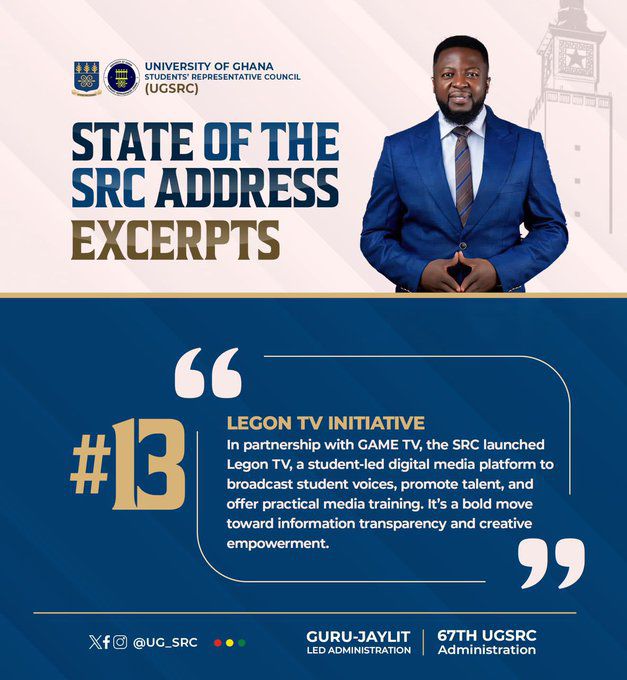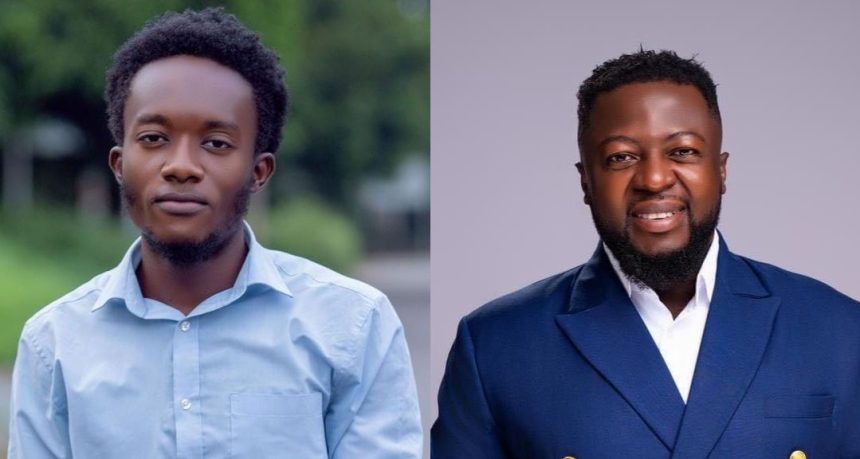Guru’s Legon TV Agenda:
In the corridors of campus power, some leaders rise with conviction and others with well-packaged promises. At the University of Ghana, the current SRC President, His Excellency Maradona Yeboah Agyei, popularly known as Guru, once stood as a visionary, boldly declaring his mission to amplify student voices by giving the university what it lacked: a TV station. But as his tenure nears its final chapter, we are left with an unsettling silence on a key partner in this media dream: Radio Univers. Is it fair to say that Guru leveraged the influence and credibility of Radio Univers, Ghana’s most respected campus radio station, to win the hearts of students, only to turn his back on it when it was time to deliver? The facts speak louder than opinions.
The Promise that Made Headlines
Video Source: UTV Ghana (via Facebook)
In an episode of United Showbiz on UTV on 20th April, 2024, posted by United Television’s official Facebook page, students were glued to their screens as Guru voiced his frustrations about the lack of investment and recognition Radio Univers receives. He expressed disappointment that a university as prestigious as Legon had no TV station to complement its long-standing radio operations.
And then came the punchline:
“We are growing. The only medium that sends communication to the public is just radio — Radio Univers. And how competitive is Radio Univers? So, I think that we should upgrade it to a TV… It makes sense!” Guru said, winning the hearts of many students and alumni watching that night.
His words were emphatic. He even compared the university to churches with smaller audiences but larger media ambition.
“Because even the churches that have fewer congregations can own a TV station,” he argued, “So if the University of Ghana has a TV station, it will help.”
His passion seemed genuine. His mission? Revolutionary. But then came the pivot.
From Campaign Tool to Political Casualty?
After the UTV interview, Guru’s subsequent media appearances conspicuously dropped any mention of Radio Univers or the TV station promise. His agenda moved on to generic issues: hall facilities, sick bays, student advocacy. All important, yes, but the boldest and most memorable promise of his campaign quietly disappeared from public conversation. More than three months of radio silence passed.
And Then, A Quiet Resurfacing
Fast forward to 28th April, 2025. With less than two months to the end of his administration, the SRC released a Google Form link, inviting students to apply for roles in “Legon TV.” No official announcement. No collaboration with Radio Univers. The long-awaited dream is finally taking shape. The station is either about to launch or is actively being developed. Production teams, content creators and presenters are all being assembled. This is it’s a deliberate sidelining of the very institution that gave this dream its platform.
Radio Univers was the springboard for that promise. Why is the University’s official media outlet, with over 30 years of training, experience and infrastructure, not visibly part of the Legon TV project? Guru rode our airwaves, spoke to our listeners, and used the credibility of our station as his media launchpad. Yet, today, we are not stakeholders; we are strangers watching from the sidelines. The lack of collaboration feels like an intentional detour. To some students and us volunteers at Radio Univers, it now appears that Guru’s initial praise of Radio Univers was merely a stepping stone to national relevance.

What Does That Say About Leadership?
Leadership is not just about doing something nice. It’s about doing it right. And what is the point of launching a “Legon TV” if it excludes the legacy, institutional knowledge and technical capacity of Radio Univers? Why has there been no consultation? No joint planning? No transparent collaboration? If this is truly about advancing student media, then why build walls between platforms instead of bridges?
The Bigger Picture
This is not just a Radio Univers issue. This is a conversation about accountability, transparency and integrity in student leadership. When leaders make promises on national television, they don’t just raise expectations; they write public contracts with those who believe in their words.
Guru’s last-minute move to establish Legon TV raises more questions than it answers. Why has the process been so quiet, lacking the transparency one would expect of such a major development? And perhaps most pressing of all, why has Radio Univers, the very platform he publicly credited and promised to uplift, been excluded from the picture?
In a recent development, the Guru-led SRC has released its State of the SRC Address, in which it claims:
“In partnership with Game TV, the SRC launched Legon TV—a student-led digital media platform to broadcast student voices, promote talent, and offer practical media training. It’s a bold move toward information transparency and creative empowerment.”
While this may appear to be a commendable step, it raises fresh concerns. Why would the SRC choose to partner with Game TV, an obscure or largely unfamiliar outlet within the student community, over Radio Univers, the university’s officially recognised and established media house with over 30 years of proven excellence? If the goal was truly to empower students and promote transparency, would it not have made more sense to collaborate with a station that already embodies those values and has a deep-rooted connection to the university?
This decision not only sidelines a credible institution but also undermines the very ethos of continuity, legacy and trust in student-led media initiatives.
Final Thoughts
To draw a curtain on this issue, collaboration should not just be a buzzword thrown around in campaigns. It should be a lived reality, especially when promises have been made so publicly. There’s still time to right this wrong. Guru may still leave a legacy, but only if he remembers where that vision began. He may even leave behind a lasting media legacy. But suppose the cost of that is the disregard of Radio Univers, the very platform that made his advocacy credible in the first place. In that case, he risks writing a story that begins with unity but ends in disconnection.
As the Head of Entertainment at Radio Univers, I raise these concerns not out of bitterness, but out of principle. Because the legacy of this station is not one to be reduced to a political springboard. And any TV station that hopes to serve the University of Ghana student body without it is not a complete vision, but a fragmented one. So, as the SRC President prepares to exit the stage, the resounding question remains: Did Guru ride the Radio Univers wave only to ditch it? Because while microphones can be turned off, and cameras eventually cut, promises made in the name of students don’t disappear; they echo.
Story by Kelvin Bildad Annor-Yeboah (Kvng Kelly) | univers.ug.edu.gh
Edited by Kelvin Bildad Annor-Yeboah (Kvng Kelly)





